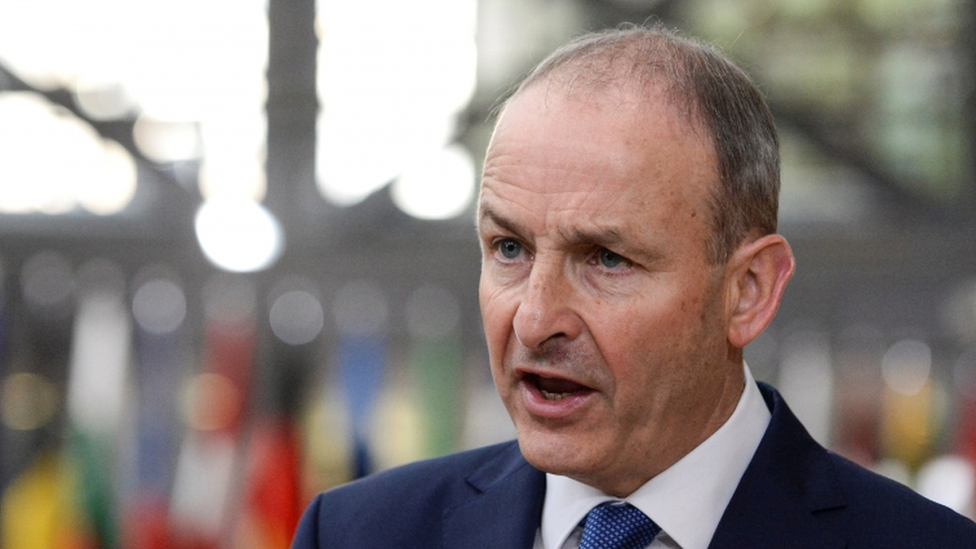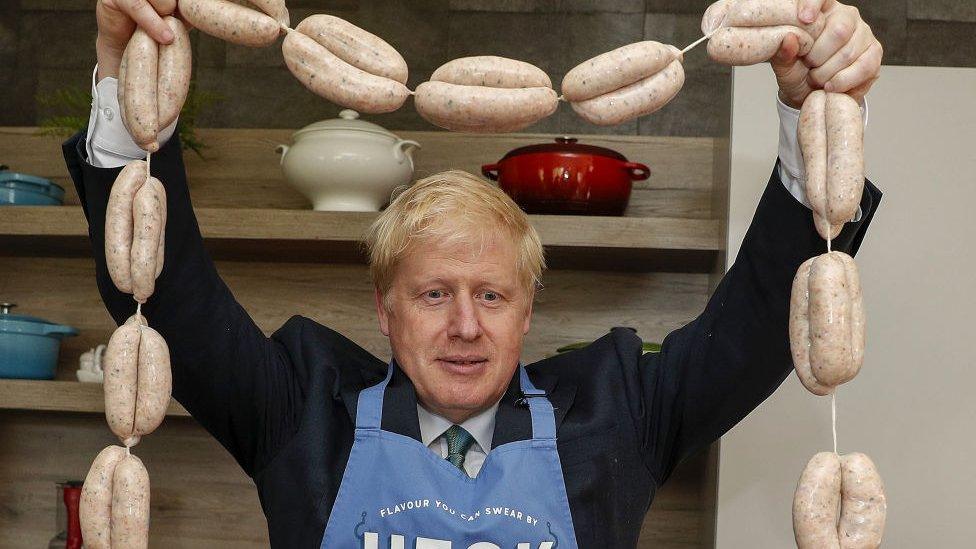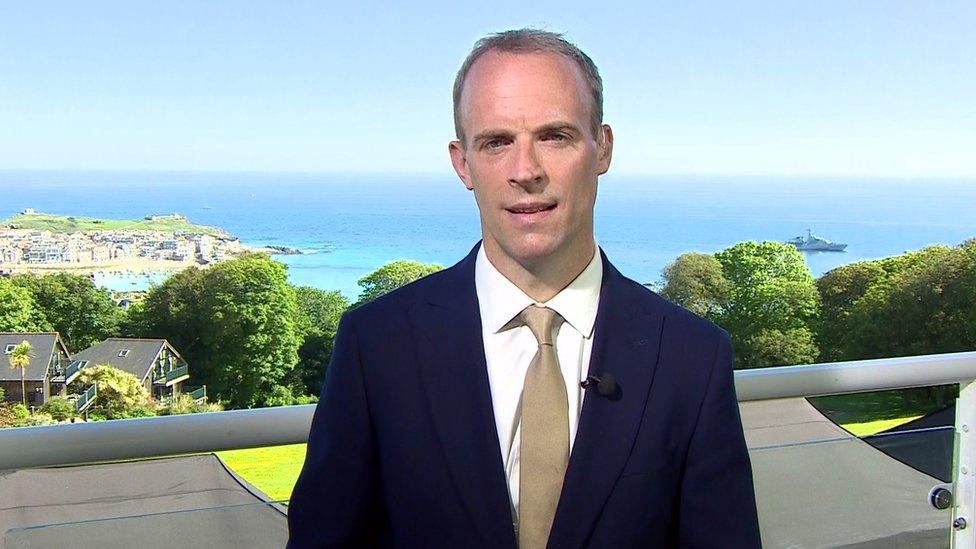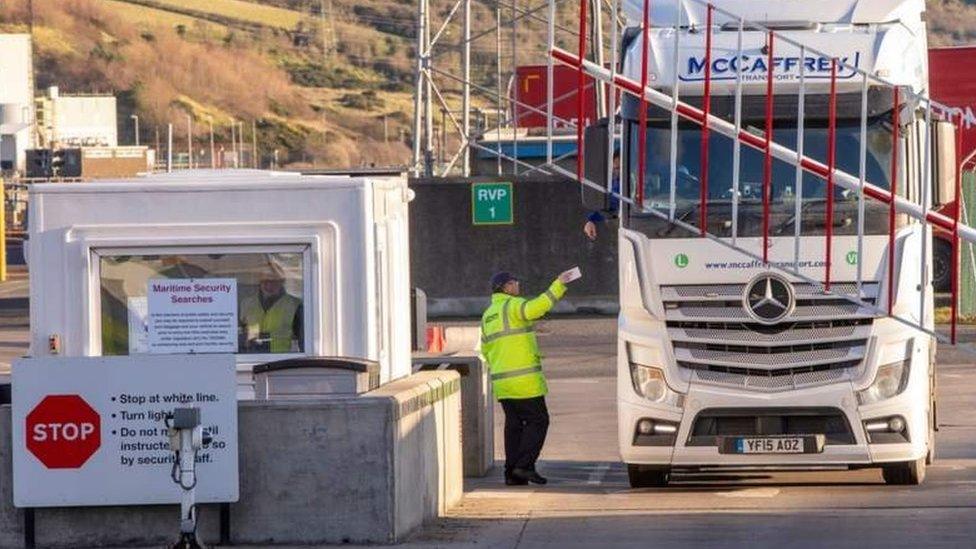Brexit: GB-NI grace period extension 'problematic' - Irish PM
- Published

Micheál Martin says unilateral action would strain relations
The taoiseach (Irish PM) has said it would be "very problematic" if the UK government unilaterally extended the grace period for restrictions on chilled meats moving between GB and NI.
Micheál Martin told Sky News that such a move would strain relations.
It comes after discussions between the UK and EU at the G7 failed to break the deadlock over the NI Protocol.
EU food safety rules do not allow chilled meat products to enter its market from non-members, like the UK.
This has led to the prospect of British sausages being banned from Northern Ireland, which has remained in the EU single market for goods.
Frozen or cooked products would still be permitted.
A six-month grace period - during which the rules do not apply - has been in place since January.
But under the terms of the protocol, it runs out at the end of this month.
If an agreement cannot be reached, the UK says it is ready to ignore the rules.
However, the EU has warned it will respond with legal action which could lead to the introduction of tariffs on British goods.
The EU has said the UK's decision to extend the grace period breaks international law because it wasn't consulted.
Mr Martin acknowledged that "issues have arisen that are causing concern" and "the necessity to reduce tensions" but stressed the Irish government has "never seen the protocol as a constitutional issue".

Under EU law, certain chilled products - like sausages - cannot enter its market
"It doesn't in any way interfere with the constitutional status of Northern Ireland as defined and articulated in the Good Friday Agreement, we're very clear from the Irish government perspective on that," he said.
"But we do believe in seamless trade on the island of Ireland - it makes sense - and we believe in seamless trade, in so far as we possibly can, between the United Kingdom and Northern Ireland.
"It's not about sausages per se, it really is about the fact that an agreement had been entered into not too long ago.
"If there's consistent, unilateral deviation from that agreement, that clearly undermines the broader relationship between the European Union and the United Kingdom, which is in nobody's interest."
The UK is also due to ban the import of chilled EU meat products to Great Britain in October.
DUP MP Gregory Campbell said the Irish government had to realise the seriousness of unionist opposition to the NI Protocol.
Speaking to RTÉ, he said: "I guess that Boris Johnson is beginning to (understand it), from what he's said over the past couple of days.
"But I'm afraid the taoiseach and tánaiste (Irish deputy prime minister) haven't yet grasped how difficult this is and they need to very, very quickly."
'Offensive'
Meanwhile, UK Foreign Secretary Dominic Raab has criticised EU figures for characterising Northern Ireland as "somehow being a separate country" from the UK for years.
He was speaking after it was reported that French President Emmanuel Macron had described Northern Ireland as not being a full part of the UK.
Mr Raab told the BBC's Andrew Marr Show said he found such language "offensive".

Foreign Secretary Dominic Raab criticised EU figures for characterising NI as not a full part of the UK
Asked about discussions on the Northern Ireland Protocol, Mr Raab said the UK needs "a flexible approach", looking at all of the protocol's provisions.
"The ball is in the EU's court - the prime minister was very clear about it.
"We're willing to be flexible and pragmatic but they must come back with the reciprocal goodwill to make that happen.
"The EU needs to apply Article 6 of the Northern Ireland Protocol to facilitate the free flow of trade between Britain and Northern Ireland."
Mr Raab said that one in five of all controls and checks around the EU's periphery, to protect the integrity of the single market, are now conducted in Northern Ireland.
"That's triple what we see in Rotterdam, double what we see in France. That shows you in real terms how disproportionate and lopsided the approach has been," he added.
Related topics
- Published2 February 2024

- Published10 March 2021
